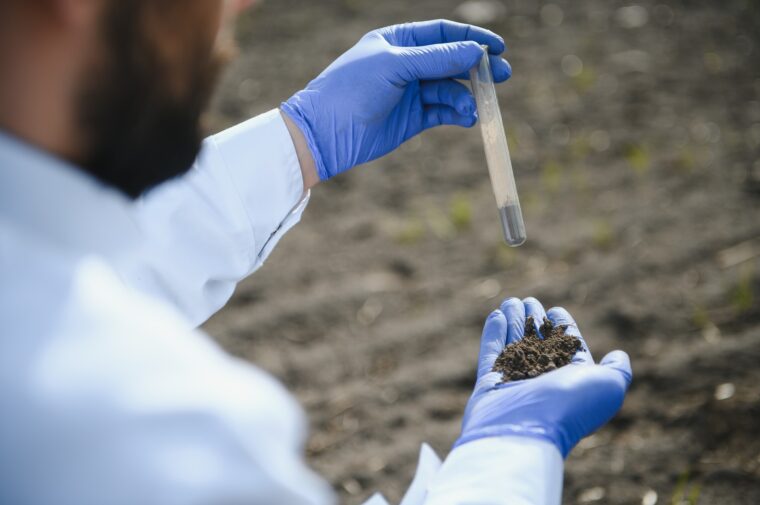5 Common Soil Issues Identified Through Professional Soil Testing

Soil testing is a crucial aspect of modern agriculture and gardening, helping identify various soil problems that can impact crop yield and plant health. By conducting professional soil testing, farmers and gardeners can enhance soil quality and boost productivity. In this article you’ll find five common soil issues that can be identified through professional soil testing.
1. Soil pH Imbalance
Understanding Soil pH
Soil pH measures the acidity or alkalinity of the soil, typically on a scale from 0 to 14, with 7 being neutral. Most plants prefer a slightly acidic to neutral pH (6.0 to 7.0). When the pH is outside this range, plants may struggle to absorb nutrients efficiently.
Effects of pH Imbalance
Soil pH that is too high (alkaline) or too low (acidic) can lead to nutrient deficiencies or toxicities, impacting plant growth and crop yield. For example, an acidic soil environment can lead to aluminum toxicity, while alkaline soil can cause iron and manganese deficiencies.
Solutions for pH Imbalance
Amendments such as lime (to raise pH) or sulfur (to lower pH) can be added to balance the soil pH. Professional soil testing identifies the precise pH level, guiding the appropriate corrective measures.
2. Nutrient Deficiencies
Key Soil Nutrients
Essential nutrients for plants include nitrogen (N), phosphorus (P), potassium (K), calcium (Ca), magnesium (Mg), and sulfur (S). Nutrient deficiencies can severely hinder plant growth and crop productivity.
Detecting Deficiencies
A comprehensive soil test can reveal nutrient levels in the soil, indicating whether any nutrients are lacking. For example, a nitrogen deficiency can cause stunted growth and yellowing leaves, while phosphorus deficiency may lead to poor root development.
Addressing Nutrient Deficiencies
Farmers and gardeners can address nutrient deficiencies by applying the appropriate fertilizers and soil amendments. A tailored fertilization plan, based on soil test results, ensures plants receive the nutrients they need for optimal growth.
3. Soil Compaction
Causes of Soil Compaction
Soil compaction occurs when soil particles are pressed together, reducing pore space and impeding air and water movement. This condition is often caused by heavy machinery, foot traffic, or livestock grazing.
Identifying Compaction
Professional soil testing can measure bulk density and other indicators of compaction. Compacted soil typically exhibits poor drainage, increased runoff, and restricted root growth.
Mitigating Soil Compaction
To alleviate soil compaction, practices such as deep tillage, aeration, and the use of cover crops can be employed. These methods help to break up compacted layers and improve soil structure.
4. Salinity
The Impact of Soil Salinity
Excessive soil salinity can harm plant growth by disrupting the water uptake process and causing ion toxicity. Salinity is especially problematic in arid and semi-arid regions where irrigation is common.
Detecting Salinity
Soil testing for electrical conductivity (EC) provides an indication of soil salinity levels. High EC values suggest elevated salt concentrations in the soil.
Managing Salinity
To manage soil salinity, strategies such as improving drainage, applying gypsum, and using salt-tolerant crop varieties can be effective. Regular soil testing helps monitor salinity levels and adjust management practices accordingly.
5. Organic Matter Content
Importance of Organic Matter
Organic matter plays a vital role in soil health, contributing to nutrient availability, water retention, and soil structure. A high organic matter content generally indicates fertile, productive soil.
Measuring Organic Matter
Professional soil testing can determine the percentage of organic matter present in the soil. This information guides decisions on the addition of compost, manure, or cover crops to boost organic matter levels.
Enhancing Organic Matter
Incorporating organic amendments and rotating crops can enhance soil organic matter. Maintaining adequate organic matter is crucial for sustainable soil management and long-term agricultural success.
Conclusion
Professional soil testing is an invaluable tool for identifying and addressing common soil issues. Regular soil testing not only helps in diagnosing existing problems but also in preventing future issues, ensuring sustainable and productive agricultural practices.
